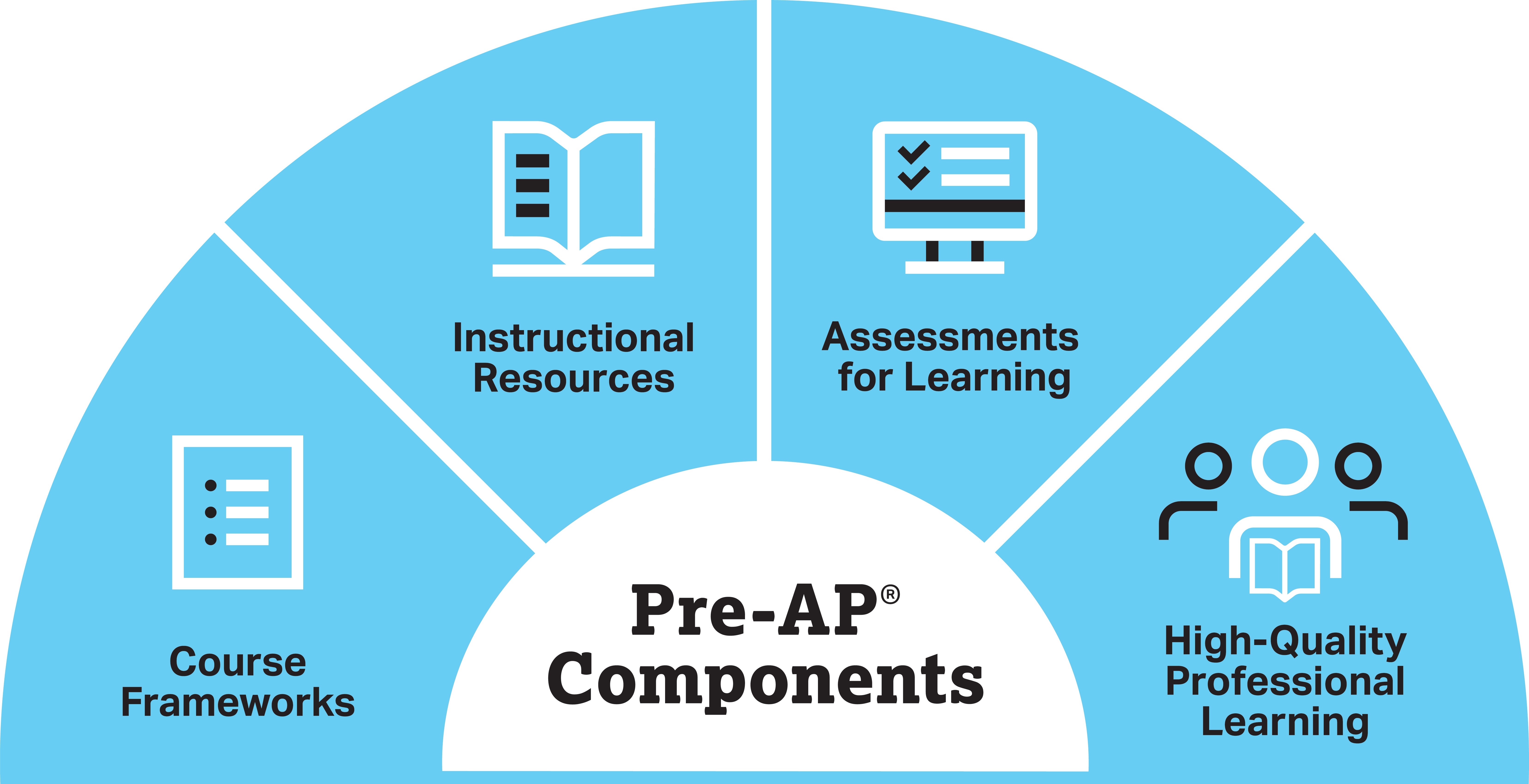What Is Pre-AP?
What Pre-AP Is:
- Pre-AP features grade-level instruction intended to give all students the opportunity for growth.
- Pre-AP offers a focused framework, instructional support, model lessons, and classroom assessments.
- Pre-AP focuses on skills that students will need to succeed in AP courses, college, and careers.
- Pre-AP is back-mapped from AP courses, with input from teachers in middle school, high school, and colleges. Most students take Pre-AP in grades 9 and 10, though some schools offer these high-school level courses in middle school.
What Pre-AP Is Not:
- Pre-AP is not an honors program—it’s grade-level instruction that meets students where they are.
- Pre-AP is not a curriculum. Although robust model lessons are provided, teachers have flexibility to design their own instruction based on the course framework.
- Pre-AP does not have a final exam and does not provide college credit.
Understand Pre-AP Goals:
The Pre-AP Program’s objectives are to:
- Offer every student access to a high-quality education that prepares them for success in high school and beyond, including AP courses
- Provide educators with engaging resources and targeted assessments to support student success with grade-level expectations.
Understand Pre-AP Shared Principles:
Pre-AP challenges students to build critical thinking skills through these shared principles:
Close Observation and Analysis: Students carefully observe a data set, text, image, or problem--capturing relevant details before attempting to explain, analyze, or evaluate.
Evidence-Based Writing: Students learn to craft precise sentences before progressing to longer forms of writing—applying these skills as they craft claims, develop arguments, and provide explanations.
Higher-Order Questioning: Students engage with questions that are elevated beyond simple recall as they make predictions, synthesize, evaluate, and compare--learning that deep questions lead to deeper understanding.
Academic Conversation: Students become active participants in their own learning through frequent opportunities to compare, critique, debate, and build upon others' ideas--recognizing that all voices, including their own, deserve to be heard.
Understand Pre-AP Core Components:
When your school offers Pre-AP, there are four primary components to the program:
Focused Course Frameworks: By defining what students should know and be able to do by the end of the course, the frameworks provide a blueprint teachers can use to plan targeted instruction to meet their students' needs. By devoting more time to fewer concepts, all students are able to achieve success and mastery of grade-level-appropriate material.
Instructional Resources: Model lessons feature motivating classroom activities, engaging texts, and challenging practice--developed in close collaboration with educators and illustrating how to apply the framework, shared principles, and areas of focus to daily instruction.
Assessments for Learning: Pre-AP digital learning checkpoints are low-stakes, formative assessments intended to inform both instruction and learning. Performance tasks are performance-based unit assessments that provide teachers with the opportunity to measure student performance on key concepts that aren’t easily measured by multiple-choice questions. A Pre-AP Question Bank (beginning the 2025-26 academic year) allows teachers to select questions or craft their own to design quizzes that provide and opportunity for students to demonstrate their success with the skills and content outlined in the course framework.
Professional Learning: Pre-AP offers a rich and varied menu of free professional learning opportunities rounded out by optional, for-a-fee workshops. These include:
- Pre-AP Readiness Workshops (for a fee): Designed as an introduction to the design and pedagogy of the Pre-AP program for all teachers grades 6-12. Does not require implementation of Pre-AP courses.
- Online Foundational Modules (free with course purchase): Course-specific online modules, take new Pre-AP teachers through course frameworks, Pre-AP shared principles, assessments, and best practices for implementation. Online modules for new Pre-AP administrators, help leaders understand the program’s instructional design and commitments. The Pre-AP Coordinator Online Module supports coordinators with the management of the Pre-AP program at the school site.
- Online Scoring Modules (free with course purchase): Teachers learn how to score performance tasks and provide effective feedback.
- Experienced Pre-AP Teacher Online Modules (free with course purchase): These course-specific modules serve to reinforce key program ideas, while supporting teachers in refining instructional practice and planning their course.
- Pre-AP Summer Institutes (for a fee): New Pre-AP teachers and new Pre-AP administrators have the option of an in-person or virtual, collaborative experience.
- Experienced Pre-AP Teacher Workshops (for a fee): In-person workshops that reinforce key Pre-AP program ideas, offer ready-to-ty ideas, and support teachers to refine their Pre-AP courses.
- Pre-AP Teacher Community (free with course purchase): This is a place to share ideas, resources, contacts, and best practices with peers. It’s available on Pre-AP Classroom.


